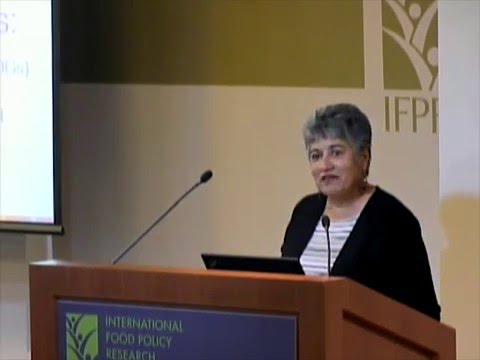UN Sustainable Development Goal (SDG) 16 calls for the global community to “promote peaceful and inclusive societies for sustainable development, provide access to justice for all and build effective, accountable and inclusive institutions at all levels.” Speaking at a recent panel discussion held at IFPRI’s home office, John Coonrod, executive vice president of The Hunger Project, revealed that no fewer than 12 of the 17 SDGs require integrated solutions at the community level. Coonrod defined community driven development as the step-by-step process of empowering communities to take charge of their own progress, adding that it represents a fundamental right that should be available to everybody, everywhere.
According to Coonrod, the passage of the SDGs ushers in a new era of thinking for addressing some of our most pressing development challenges; now, we must focus on integrated solutions at the community level. “Unless you have a comprehensive package of services at the community level,” he said, “women can never escape from extreme poverty.” Moreover, improved access to nutritious food, gender equality, and resolving health crises cannot advance without acknowledging that they all come together most naturally at the community level.
“We need to get away from the notion that community-based development is not scalable—in fact, that is probably the only way to do large-scale development” said Nancy Lee, deputy chief executive officer of the Millennium Challenge Corporation (MCC). Lee asserted the importance of bringing together interventions across various sectors and pointed out that much of her work at MCC involves behavioral change, which is only accomplished through local ownership of the projects and their impacts.
Citing MCC cases from the Philippines, Indonesia, and Senegal, Lee explained that giving communities the authority to choose, oversee, and implement projects helps to build a long-term system for local governance and decision making. She highlighted the power of community-led development by reflecting on a case in the Senegal River Valley where communities had the authority to allocate land and implement a land tenure program, which led them to resolve the problem of land rights for women and landless herders—a solution which would have been impossible for outsiders to impose.
Community-led development requires good governance in the form of strong citizen-state contracts and sustainable local governance systems. “What is the hope for people to become effective and engaged in a democracy if they grow up in an authoritarian environment where the basic skills for survival are followership, obedience, and loyalty?” asked Nancy Wilson, chief executive officer of Relief International (RI). She emphasized that building foundational skills such as transparency, accountability, and deliberation into programs is key to developing both a supply of and demand for good governance.
“If there is not internal, individual change, a lot of this community work we’ve been talking about can be very ephemeral,” concluded Pierre Ferrari, president and chief executive officer of Heifer International. He then described an example exercise Heifer staff use in the field to spark that change: individual household members receive a bracelet for each task they completed earlier that day. At the end of the exercise, women’s arms and wrists often are full of bracelets while men may be wearing just a couple: a powerful illustration of the importance of women’s contributions to the household.
Ferrari also underscored the importance of shifting from a supply-driven to a demand-driven approach in community development. Demand-driven approaches, he argued, allow for better local understanding of and commitment to inclusive value chains that are crucial for creating wealth and pulling the most vulnerable members of society out of poverty.
“In programmatic work, it is really important to not ignore the fact that users, citizens, and community members have the first-order incentives to get good public service—so accountability to them really matters,” said Tewodaj Mogues, senior research fellow at IFPRI. Yet she also underscored the need to unpack the term “community,” pointing to research evidence showing that better-off community members often benefit most from project interventions often at the expense of marginalized groups, such as women and the poorest members of the same target community. Ultimately, inequality weakens responsive institutional arrangements since it demonstrates how the projects are not accountable to everyone they are intended to benefit.
Speaking on the theme of accountability, Coonrod proposed that we would be well served by asking ourselves whether or not our work will make any difference to the smallholder woman farmer living in a remote village. Lacking access to transportation and external markets, she requires services and responsive decision making processes within a six mile radius of where she lives. “Her fundamental right to participate in governance, participate in her own development, demonstrate her wisdom and creativity depends on having those institutions at the community level,” he concluded.







